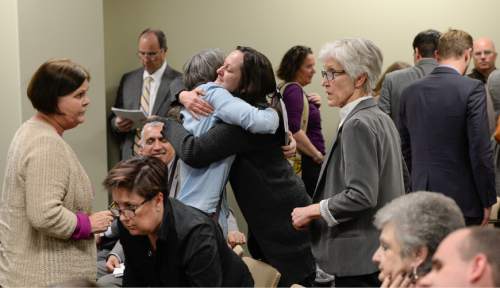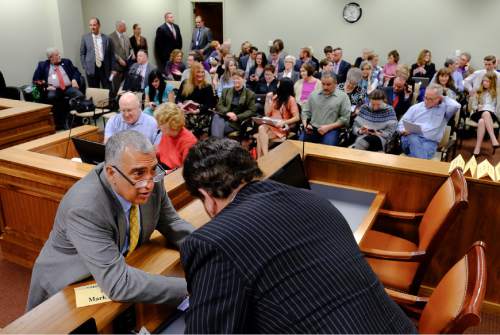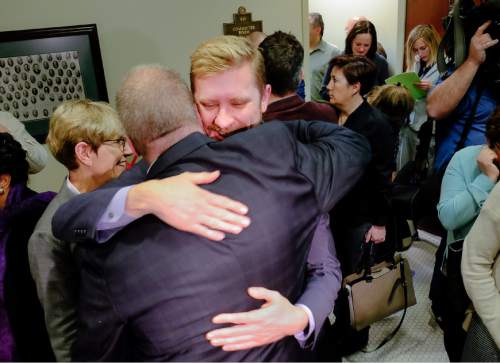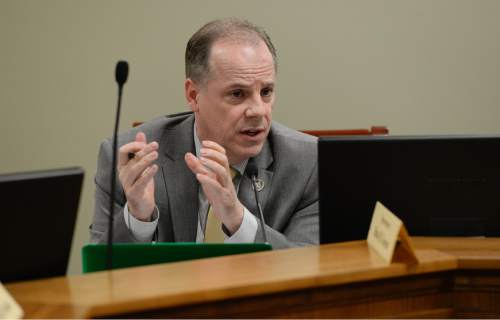This is an archived article that was published on sltrib.com in 2015, and information in the article may be outdated. It is provided only for personal research purposes and may not be reprinted.
A bill which marries nondiscrimination protections for the LGBT community with safeguards for religious liberties took another step on Tuesday, as a House committee advanced the bill with near unanimous support toward its final legislative vote.
After two days of public comment and debate, the Judiciary Committee voted 9-2 to send SB296 to the full House, where it has a chance to become a first-of-its-kind law in the state.
SB296 would amend Utah's existing anti-discrimination laws for housing and employment to include sexual orientation and gender identity, clarify exemptions for religious institutions and provide protections for religious expression.
While nearly 20 cities have adopted local ordinances granting discrimination protections, proposed statewide legislation has failed to pass in each of the past six years, including three attempts by bill co-sponsor Sen. Steve Urquhart, R-St. George. Last year, legislative leaders entirely blocked debate on the proposal, as the state awaited court rulings on Utah's same-sex marriage ban.
"For me there's cause enough to celebrate in that I actually got it through a committee," Urquhart said following Tuesday's vote. "That was a huge step forward."
SB296 passed the Senate with broad support last week and is the product of negotiations between lawmakers; the lesbian, gay, bisexual and transgender community; and The Church of Jesus Christ of Latter-day Saints, which has stated its rare — some have said historic — support for the legislation.
Co-sponsored by Urquhart and Sen. Stuart Adams, R-Layton, the measure would make it unlawful for employers and landlords to discriminate against individuals based on their sexual orientation or gender identity.
Religious organizations and their affiliates would be exempt from the bill's requirements. The bill also specifically exempts the Boy Scouts of America, which can't be forced to hire gay leaders under a U.S. Supreme Court ruling from 2000.
Its other religious protections would prevent workers from being fired for expressing beliefs on marriage, family or sexuality unless they conflict with the employer's business interests.
Gov. Gary Herbert has said he intends to sign SB296 if it comes to his desk.
Urquhart declined Tuesday to handicap SB296's chances in the House, but said he and Adams had attended a Republican House Caucus meeting to answer questions and address concerns.
"The more people know about this legislation, the more comfortable they are becoming," Urquhart said. "Even the folks who are still against it … they are raising valid concerns. Sometimes they are raising a few misconceptions, but everyone's trying to find the sweet spot on this."
SB296 will have some competition from Rep. LaVar Christensen's HB322, which proposes its own balance of nondiscrimination and religious liberty protections, including sweeping allowances for individual conscience.
In Judiciary committee hearings both Monday and Tuesday, Rep. Brian Greene, R-Pleasant Grove, questioned whether SB296 strikes the right balance between LGBT and religious rights.
Specifically, Greene said he wasn't certain if the bill would have protected former Salt Lake City police officer Eric Moutsos, who told the committee on Monday that he was disciplined by his bosses after citing his religious beliefs as grounds for asking to be excused from performing with a motorcycle squad during the 2014 gay pride parade.
"I am not convinced that officer would be protected," Greene said on Monday, adding he fears the bill is "fraught with those types of ambiguities."
Greene voted against the bill, as did Rep. Curtis Oda, R-Clearfield.
Some from the public stated their religious objections to codifying in law what they believed would be "special rights" for LGBT persons.
"Man has no right to support what God has forbidden," said Colton Bennett, 15, of Wanship, who is an intern for the conservative Utah Eagle Forum. "Sexual orientation is not a civil right and should not be made a protected class."
House Minority Leader Brian King, D-Salt Lake City, said he's troubled that some continue to use religion as the basis for bias against the LGBT community and said the bill won't create special rights.
"We all have a gender identity. We all have a sexual orientation. The language of this bill protects everyone," said King, adding that faiths hold many differing views. "Whose religion are we talking about?"
University of Illinois law professor Robin Wilson, a religious-liberties expert who came to Utah to help draft SB296, told the committee she believes it will be a model for other states because it provides both robust religious exemptions and protections for individual rights.
"Outside the workplace, you can't get dinged for attending an Equality Utah rally … you can't get dinged for giving $1,000 to Prop. 8," she said, referring to the 2008 California initiative that attempted to ban same-sex marriage. "That's parity."
On another front, the Senate on Monday night advanced a bill that would allow government workers to refuse to perform gay weddings, but would force them to give up the privilege of marrying others in return.
SB297 passed on a vote of 25-4 vote on its way to the House. Sponsored by Sen. Stuart Adams, R-Layton, the bill seeks to provide direction to government agencies, specifically county clerk's offices, which may have struggled to address changes since Utah's law barring same-sex unions was overturned by a federal judge.
Equality Utah and the Utah chapter of the American Civil Liberties Union have opposed the bill and say it could give broad latitude for people of faith to deny services and equal treatment to those in the lesbian, gay, bisexual and transgender community.
In his appeal to his Senate colleagues to support the bill, Adams said he wanted to ensure "fair and equal" treatment to all couples.
"Tolerance, respect and compassion, that's what is important," Adams said.
SB297 would also prevent government retaliation against individuals who invoke religious beliefs as grounds for refusing to perform weddings or provide accommodation and prohibits religious beliefs from being a consideration in any state licensing matter, by protecting the conduct of licensed professionals outside the workplace.









